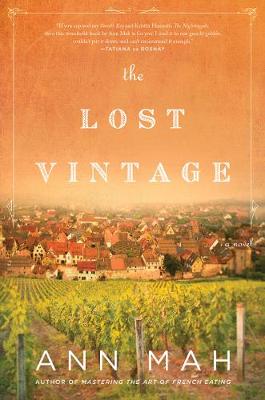Purchase Links
HarperCollins | Amazon | Barnes & Noble
I've read Ann Mah's nonfiction about french food while traveling through France, so I jumped at a chance to read her fiction about a vineyard in Burgundy.
This book was inspired by stories of what happened to French women following D-Day. Many were treated as traitors for having collaborated with the Germans. This was mob justice so no investigations were done to see who was innocent and who wasn't. No distinctions were made for women who willingly were sleeping with German soldiers and those who were raped. Women who had nothing to do with the Germans were turned in as collaborators by angry neighbors.
There is a lot going on in this book. The present day story involves a woman who is studying for a wine test. She goes to a family vineyard where the current generation is trying to modernize against the will of the older generation. There is an ex-fiance next door. There is a potential new love interest who may be up to no good. (I felt like that was a story line that could have been taken out.) She finds a hidden area in the wine caves with evidence of a relative that no young people have heard of and no older people will discuss.
I found the historical fiction aspect of the story more interesting. Helene-Marie's story is told mainly through her journal. They find out that she was denounced as a collaborator after D Day. This causes some issues in the family because no one wants to think of their family helping the Nazis. Do they want to dig deeper into what really happened?
This is an interesting point to raise. We all want to think that we (and by extension our families)would be on the right side of history but that obviously isn't true. I think about this a lot. I want to be on the morally correct side of conflicts, not just a bystander who let things happen because they weren't affecting me directly.
Using a journal as a story telling device lets the author dive deeply into what life was like in occupied France. It shows clearly how much there was to gain by collaborating with the Germans. Do you starve with your morals intact or do you live through actions that you might have previously disapproved of? Do you let your family starve? What were the risks of working with the Resistance?
About Ann Mah
Ann Mah is a food and travel writer based in Paris and Washington DC. She is the author of the food memoir Mastering the Art of French Eating, and a novel, Kitchen Chinese. She regularly contributes to the New York Times’ Travel section and she has written for Condé Nast Traveler, Vogue.com, BonAppetit.com, Washingtonian magazine, and other media outlets.
Find out more about Ann at her website, and connect with her on Facebook, Instagram, Twitter, and Pinterest.
Instagram Features
Tuesday, August 6th: Instagram: @jennsbookvibes
Wednesday, August 7th: Instagram: @tarheelreader
Thursday, August 8th: Instagram: @lavieestbooks
Friday, August 9th: Instagram: @rendezvous_with_reading
Saturday, August 10th: Instagram: @basicbsguide
Sunday, August 11th: Instagram: @giuliland
Monday, August 12th: Instagram: @crystals_library
Monday, August 12th: Instagram: @reallyintothis
Review Stops
Tuesday, August 6th: BookNAround
Wednesday, August 7th: A Chick Who Reads
Thursday, August 8th: I Wish I Lived in a Library
Friday, August 9th: Write – Read – Life
Monday, August 12th: Lesa’s Book Critiques
Tuesday, August 13th: Books and Bindings
Wednesday, August 14th: Iwriteinbooks’s blog
Thursday, August 15th: Ms. Nose in a Book
Friday, August 16th: Based on a True Story
Wednesday, August 21st: Into the Hall of Books
Thursday, August 22nd: Always With a Book
Friday, August 23rd: Bookapotamus
This review was originally posted on Based On A True Story
